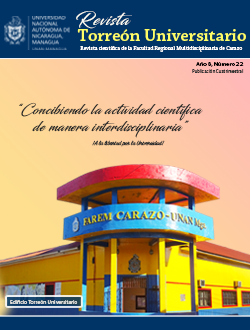Motivational and psycho-pedagogical elements in digital educational materials for self-learning in the virtual modality
DOI:
https://doi.org/10.5377/torreon.v8i22.9027Keywords:
self-learning, motivation, online education, digital educational materials, ARCS modelAbstract
The study focuses on the motivational and psycho-pedagogical elements of digital educational materials for self-learning in virtual mode, the research was conducted in the Department of Educational Technology of UNAN-Managua (DTE UNAN-Managua), taking as a scenario undergraduate and graduate courses. In order to carry out the research, a theoretical framework was constructed where aspects such as: teaching and learning theories, teaching and learning strategies in virtual environments, self-regulation, motivation and virtual platforms, designs of digital educational resources, culminating with the ARCS model (Attention, Relevance, Confidence and Satisfaction) were addressed. The methodological design has a qualitative approach of phenomenological type, since it was necessary to analyze the opinion of the key informants, because of this, instruments were used as interviews to directors, open questionnaires to teachers and students and the direct observation of virtual courses, specifically in the digital educational materials. From the process of analysis and discussion of results, it was obtained that teachers are specialists in the different disciplines, but there is no distinction between the role of teacher and virtual tutor. With respect to digital educational materials, it was identified that the design does not include some motivational and psych pedagogical aspects, since teachers are not clear about these aspects. It was evidenced that there are some strengths that should be maintained in practice, and a proposal was made for actions for the weaknesses found, based on the ARCS model. The study ends with the presentation of new lines of research, which strengthen the work carried out.
Downloads
846
PDF 234
HTML (Español (España)) 953
HTML 140
References
Anderson, T. y Dron, J. (2011). Tecnología para el aprendizaje a través de tres generaciones de pedagogía a distancia mediada por tecnología. Athabasca University, Canadá. Revista Mexicana de Bachillerato a Distancia. Recuperado de http://bdistancia.ecoesad.org.mx/?articulo=tecnologia-para-el-aprendizaje- a-traves-de-tres-generaciones-de-pedagogia-a-distancia-mediada-por- tecnología
Anijovich, R. y Mora, S. (2009). Estrategias de enseñanza: otra mirada al quehacer en el aula (pp. 21-25). Aique. Recuperado de http://www.terras.edu.ar/biblioteca/3/3Como-ensenamos-Las-estrategias- entre-la-teoria-y-la-practica.pdf
Belloch, C. (2012). Entornos virtuales de aprendizaje. Valencia: Universidad de Valencia. Recuperado de http://moodle2.unid.edu.mx/dts_cursos_mdl/pos/ED/AV/AM/07/Entornos.p df
Belloch, C. (2013). Diseño instruccional. Universidad de Valencia. http://www. uv. es/~ bellochc/pedagogia/EVA4. pdf, Enero. Recuperado de http://cmapspublic.ihmc.us/rid=1MXBYRSF8-1Y2JTP7-RM/EVA4.pdf
Díaz, A., y Hernández, R. (2002). Estrategias docentes para un aprendizaje significativo. Una interpretación constructivista, 2.
Galicia-Alarcón, L., y Edel-Navarro, J. (2014). Revisión del modelo atención, relevancia, confianza y satisfacción (ARCS). Los Modelos Tecno- Educativos, 47. Recuperado de http://eduteka.icesi.edu.co/pdfdir/modelos- tecnoeducativos.pdf#page=47
Gértrudix, M., Álvarez, S., Galisteo del Valle, A., Gálvez de la Cuesta, C., y Gértrudix, F. (2007). Acciones de diseño y desarrollo de objetos educativos digitales: programas institucionales. RUSC. Universities and Knowledge Society Journal, 4(1). Recuperado de http://www.redalyc.org/html/780/78040107/
González, M. y Tourón, J. (1992). Autoconcepto y rendimiento escolar: sus implicaciones en la motivación y en la autorregulación del aprendizaje. Eunsa. Recuperado de http://dspace.unav.es/bitstream/10171/21388/1/AUTOCONCEPTO%20Y %20RENDIMIENTO%20ESCOLAR.pdf
Husserl, E. (1949). Ideas relativas a una fenomenología pura y una filosofía fenomenológica, trad. J. Gaos, México, FCE.
Tamayo, M. (1999). El proyecto de investigación. Serie aprender a investigar, módulo 2 La investigación. Instituto Colombiano para el Fomento de la Educación Superior ICFES.
Keller, J. (1987). Development and use of the ARCS model of instructional design. Journal of instructional development, 10(3), 2-10. Recuperado de https://link.springer.com/article/10.1007%2FBF02905780?LI=true
Keller, J. (2009). Motivational design for learning and performance: The ARCS model approach. Springer Science & Business Media. Recuperado de http://arcsmode.ipower.com/pdf/Motivational%20Design%20Rev%200606 20.pdf
Lamas, H. (2008). Aprendizaje autorregulado, motivación y rendimiento académico. Liberabit, 14(14), 15-20. Recuperado de http://www.scielo.org.pe/scielo.php?pid=S172948272008000100003&scrip t=sci_arttext
Montalvo, F. y Torres, M. (2004). El aprendizaje autorregulado: presente y futuro de la investigación. Revista electrónica de investigación psicoeducativa, 2(1), 1-34. Recuperado de http://portalliceo.com/Administrador/documentos/APRENDIZAJE%20AUT ORREGULADO.pdf
Pastor, J. y León, A. (2007). Complejidad y psicología social de las organizaciones. Psicothema, 19(2). Recuperado de http://www.redalyc.org/html/727/72719205/
Pimienta, J. (2012). Estrategias de enseñanza-aprendizaje Docencia universitaria basada en competencias, Ed.
Puig M., Alcaraz I. y Lafon M. (2004). Estrategias de recogida y análisis de la información. In Metodología de la investigación educativa (pp. 329-366). La Muralla.
Rodolfo, L. (2001). El dilema de las teorías de enseñanza-aprendizaje en el entorno virtual. Recuperado de http://rabida.uhu.es/dspace/bitstream/handle/10272/980/b11903302.pdf?s equence
Sabino, C. (1992). El proceso de investigación. Recuperado de https://metodoinvestigacion.files.wordpress.com/2008/02/el-proceso-de- investigacion_carlos-sabino.pdf
Schunk, D. (2012). Learning theories an educational perspective sixth edition. Pearson.
Siemens, G. (2004). Conectivismo: Una teoría de aprendizaje para la era digital. Recuperado de http://www.fce.ues.edu.sv/uploads/pdf/siemens- 2004-conectivismo.pdf
Zimmerman, B. (2000). Self-efficacy: An essential motive to learn. Contemporary educational psychology, 25(1), 82-91. Recuperado de http://www.sciencedirect.com/science/article/pii/S0361476X99910160/pdf? md5=104a5b69a556820955731e05c6e26423&pid=1-s2.0- S0361476X99910160-main.pdf
Zimmerman, B. (2002). Becoming a self-regulated learner: An overview. Theory into practice, 41(2), 64-70. Recuperado de https://www.researchgate.net/profile/Barry_Zimmerman/publication/23706 5878_Becoming_a_Self- Regulated_Learner_An_Overview/links/549483c30cf2ec133757e74d.pdf
Downloads
Published
How to Cite
Issue
Section
License
Los autores que publican en esta revista están de acuerdo con los siguientes términos.
- El autor o los autores de los artículos, ensayos o investigaciones conceden a la Universidad Nacional Autónoma de Nicaragua, Managua (UNAN-Managua) los derechos de edición (copyright) del trabajo enviado, por consiguiente la Universidad cuenta con el derecho exclusivo para publicar el artículo durante el periodo completo de los derechos de autor.
- Estos derechos de autor/ autores autorizan a la Revista Torreón Universitario y a la Universidad editar y divulgar/publicar el artículo en dicha Revista, incluyendo reproducción impresa y electrónica, el almacenamiento, recuperación y cualquier otro tipo de publicación, y fuentes de información secundaria como servicios de resúmenes y bases de datos, así mismo la facultan a proteger el artículo contra el uso no autorizado para su difusión por medios impresos o electrónicos (PDF, HTML, EPUB, XML u otros).
Licencia para el uso del contenido
La revista hace uso de la Licencia Creative Commons Atribución-NoComercial-SinDerivar 4.0 Internacional.
Bajo esta declaración:

Este revista está sujeta a una licencia de Creative Commons Reconocimiento-NoComercial-SinObraDerivada 4.0 Internacional. Puede ser copiada, distribuida y transmitida públicamente siempre y cuando se cite al autor y la fuente (Revista Torreón Universitario), no debe modificarse ni utilizarse con ningún fin comercial. La licencia completa se puede consultar en http://creativecommons.org/licenses/by-nc-nd/4.0/.


